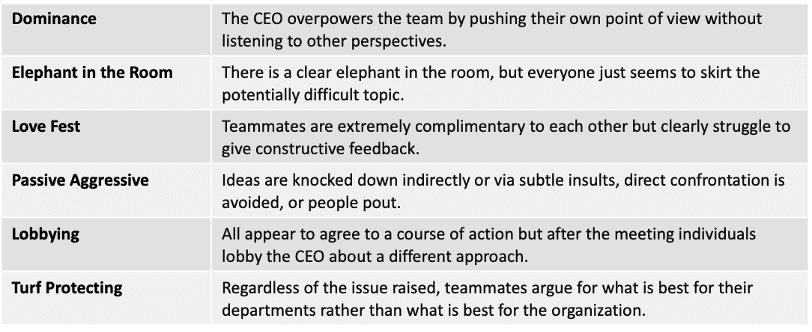Great Leadership Teams Embrace Tough Conversations


 Productive dialogue is the ability for leadership teams to challenge, debate and discuss their most important issues in a manner that progresses the issues and leaves minimal relational scars. Fostering productive dialogue is a rare practice in most organizations because it requires hard work and commitment on the part of each leadership team member and quite frankly it is natural for adults to avoid tough discussions. It is also common for dialogue to get shut down quickly—for example, when someone’s voice isn’t heard, when teammates judge or get defensive with one another or when group think sets in. The figure below sheds some light on common symptoms of non-productive dialogue.
Productive dialogue is the ability for leadership teams to challenge, debate and discuss their most important issues in a manner that progresses the issues and leaves minimal relational scars. Fostering productive dialogue is a rare practice in most organizations because it requires hard work and commitment on the part of each leadership team member and quite frankly it is natural for adults to avoid tough discussions. It is also common for dialogue to get shut down quickly—for example, when someone’s voice isn’t heard, when teammates judge or get defensive with one another or when group think sets in. The figure below sheds some light on common symptoms of non-productive dialogue.
 Productive dialogue is one of the most important elements for building a great leadership team. It relies on a foundation of trust and what Amy Edmondson refers to as psychological safety. In her landmark study on the science of teams, Edmonson coined the term ‘psychological safety’ to describe “the shared belief that it’s safe to ask one another for help, admit mistakes, and raise tough issues.” She goes on to suggest that “psychological safety is meant to suggest neither a careless sense of permissiveness, nor an unrelenting positive effect but rather a sense of confidence that the team will not embarrass, reject, or punish someone for speaking up.”
Productive dialogue is one of the most important elements for building a great leadership team. It relies on a foundation of trust and what Amy Edmondson refers to as psychological safety. In her landmark study on the science of teams, Edmonson coined the term ‘psychological safety’ to describe “the shared belief that it’s safe to ask one another for help, admit mistakes, and raise tough issues.” She goes on to suggest that “psychological safety is meant to suggest neither a careless sense of permissiveness, nor an unrelenting positive effect but rather a sense of confidence that the team will not embarrass, reject, or punish someone for speaking up.”
Most importantly, Edmonson’s research discovered that the highest-performing teams were “the ones with the highest reported errors—teammates were comfortable openly discussing mistakes.” On these teams, they weren’t afraid to tell the leader that something had gone wrong. Simply put, productive dialogue cannot occur without psychological safety. CEOs play a big role in establishing or reestablishing psychological safety for their leadership teams by modeling the key elements of productive dialogue. When they demonstrate that they are open to feedback, actively listen to different perspectives, and view confrontation as a natural part of the team’s way of operating, leadership teams are much more likely to engage more productively.
Productive dialogue enables teams to remain focused on what is most important and leverage the contributions of each team member so that creativity and innovation flourish and challenges and opportunities are proactively addressed. Establishing an environment of productively dialogue is hard work; mostly because team members often let their own insecurities and biases get in their way. Below are the key elements for building an environment where productive dialogue can thrive.
• Self-Awareness. All leaders have blind spots that sometimes hold them back from being their best as colleagues, bosses, or teammates – they think they are behaving one way while others see them showing up differently. Leaders are often shocked when they get feedback from colleagues (often for the first time) – “what do you mean I don’t listen”; “I don’t let my direct reports off the hook”; “I don’t waffle when making decisions; I am actually quite decisive.” To create an environment where team members proactively address their blind spots, team members need to commit to addressing their own first.
In her recent Harvard Business Review article, What Self Awareness Is (and How to Cultivate It), Tasha Eurich suggests that there are two types of self-awareness. Internal self-awareness represents how clearly we see our own values, passions, reactions and impact on others while external self-awareness relates to understanding how other people view us. Eurich goes on to say that experience and power can hinder self-awareness – ‘seeing ourselves as highly experienced can keep us from doing our homework, seeking disconfirming evidence, and questioning our assumptions.’ Both types of self-awareness are clearly important, but experience suggests that relationships among leadership team members are strengthened when each individual strives to understand how others view them, so they are not clouded by inaccurate assumptions and lack of diligence.
• Good Intent. On great leadership teams destructive behaviors aren’t allowed to fester or get in the way of what’s most important. When a teammate is down or unaware, their colleagues step up and help them out; they become the adult in the room this time (maybe next time they will need the same type of support). Team members react first by assuming good intentions and work diligently to read each tense or difficult situation – “Is it necessary to address this right now?” or “He must be having a bad day.” When they do engage, they do so with empathy and curiosity – “I understand why you are frustrated but we all make mistakes. I am sure that together we can figure this out.” I am in no way suggesting that being the adult in the room is easy but when teams are laser focused on what’s most important, they tend to rise above the natural relational challenges that exist on the best of leadership teams.
• Disagreement. Disagreement is an inevitable, normal, and healthy part of any leadership team. Unfortunately, many of us are not very good at disagreeing and as a result disagreement often turns into unproductive conflict. Team members either avoid disagreement for fear of being uncomfortable, wrong, or judged or enter discussions as if they were boxing matches with a win at all cost mentality. Learning how to disagree is a straightforward concept but the work is hard; especially if the team’s experience with disagreement has been less than constructive. Learning to disagree well requires three things. The first is commitment from both sides of a disagreement to be curious – listen and really try to understand other perspectives. Both parties must also try hard to shift from a ‘disagreement is awful’ mindset toa ‘we will figure this out’ mindset. Finally, and most importantly, teammates must learn, reflect, and reinforce the positive feelings and outcomes they have when they experience productive disagreement.
Don’t let your team be held back by an inability to embrace the tough conversations. Get started on your journey to build an environment where productive dialogue will thrive on your leadership team.

Chief Executive Group exists to improve the performance of U.S. CEOs, senior executives and public-company directors, helping you grow your companies, build your communities and strengthen society. Learn more at chiefexecutivegroup.com.
0

1:00 - 5:00 pm
Over 70% of Executives Surveyed Agree: Many Strategic Planning Efforts Lack Systematic Approach Tips for Enhancing Your Strategic Planning Process
Executives expressed frustration with their current strategic planning process. Issues include:
Steve Rutan and Denise Harrison have put together an afternoon workshop that will provide the tools you need to address these concerns. They have worked with hundreds of executives to develop a systematic approach that will enable your team to make better decisions during strategic planning. Steve and Denise will walk you through exercises for prioritizing your lists and steps that will reset and reinvigorate your process. This will be a hands-on workshop that will enable you to think about your business as you use the tools that are being presented. If you are ready for a Strategic Planning tune-up, select this workshop in your registration form. The additional fee of $695 will be added to your total.

2:00 - 5:00 pm
Female leaders face the same issues all leaders do, but they often face additional challenges too. In this peer session, we will facilitate a discussion of best practices and how to overcome common barriers to help women leaders be more effective within and outside their organizations.
Limited space available.

10:30 - 5:00 pm
General’s Retreat at Hermitage Golf Course
Sponsored by UBS
General’s Retreat, built in 1986 with architect Gary Roger Baird, has been voted the “Best Golf Course in Nashville” and is a “must play” when visiting the Nashville, Tennessee area. With the beautiful setting along the Cumberland River, golfers of all capabilities will thoroughly enjoy the golf, scenery and hospitality.
The golf outing fee includes transportation to and from the hotel, greens/cart fees, use of practice facilities, and boxed lunch. The bus will leave the hotel at 10:30 am for a noon shotgun start and return to the hotel after the cocktail reception following the completion of the round.